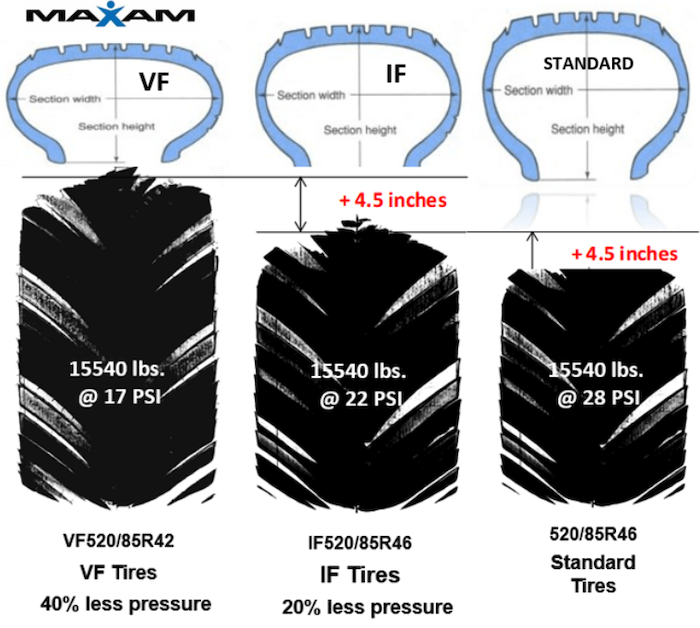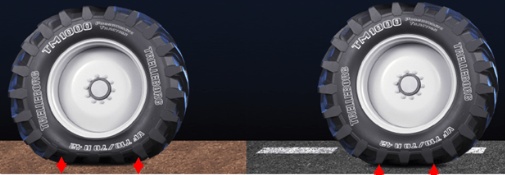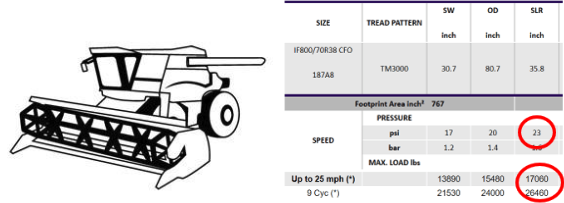
tire
VF Tires provide the greatest load carrying or axle load capacity at standard air pressures as needed.When operated at -40% air inflation pressures, VF tires will reduce soil compaction improving crop yields due to the larger tire footprint and increased flotation over the soil resulting in lower ground pressure.VF Tires are designed to operate safely with a higher heat resistance of the casing despite -40% lower air pressure on the road or in the field.VF tire pressures when operating at -40% air inflation also greatly enhance both traction and stability when on sloped or steep fields.The above conditions are matched on IF technology tires except the benefits are only 20% greater than standard tires.BKT USA, Inc. Dave Paulk: Manager Field Technical ServicesIF rated tires are made to carry up to 20% more load at the same air pressure as a standard tire. VF tires are made to carry 40% more load at the same air pressure as a standard tire. When transporting equipment at highway speeds, oftentimes this higher load capacity is needed to keep the tires from failing because of heat buildup and overload. Most MFWD tractors will run at least 30 mph and most sprayers will run 40 mph.Conversely, when used in the field, IF and VF tires can be run at less air pressure to minimize soil compaction where no till and minimum till farming is concerned. They are being run at slower speeds. However, the tires must have enough air to carry the weight of the tractor and implements. Since air pressures determine ground bearing pressure (soil compaction), IF and VF tires can be run with 20% and 40% respectively less air pressure compared to a standard tire. By running less air pressures in the field, the radial tire has a wider and longer footprint to help spread the weight of the tractor or equipment out over a wider area. This also offers better traction and more fuel savings in the field.Some IF and VF tires may be labeled as IF or VF-CFO tires. CFO (Cyclic Field Operation) tires are used mainly on combines and grain carts where the loads are cyclical or changing and not constant. At slower speeds, these tires allow load bonuses for use in the field at slower field speeds.IF-CFO tires allow a 55% load bonus at up to 10 mph cyclic.VF-CFO tires allow a 35.5% load bonus at up to 10 mph cyclic.At slower field speeds IF or VF-CFO designated tires will carry a lot of weight without having to adjust air pressures.Yokohama Off-Highway Tires America, Inc. Blaine Cox: National Product Manager—Agriculture, Golf and TurfIncreased Flexion (IF) and Very High Flexion (VF) Tires—and their ability to carry even higher loads under the Cyclic Field Operation (CFO) designation—are probably the most exciting technology in the tire business today, with the greatest potential to help improve productivity on the farm.That’s because IF and VF Tires can help farmers reduce compaction force on their soils by 20 to 40%, or carry higher loads than conventional radials without increasing compaction.IF and VF Tires are the products of amazing engineering, cutting-edge materials, and meticulous construction that allow us to construct extremely flexible, extremely tough IF and VF sidewalls and snug beads. The result is that those tires can carry extremely heavy loads at low inflation pressure without the strain and heat buildup that would occur with Conventional Radials or Bias-Ply Tires at those pressures.With IF and VF, you can also choose which benefit you want to take advantage of: Higher Load at the Same Pressure, or the Same Load at Lower Inflation. The extra flexibility in the sidewalls and outstanding performance of the casings of IF and VF Tires create a longer, larger footprint, which spreads load to reduce soil compaction, puts more lugs on the ground for greater traction, and improves fuel efficiency. The footprint can be huge—for instance, our Alliance Agriflex+ 372 VF650/65R38 spreads its load across an area of 462 square inches.On top of that remarkable capacity, there’s a Cyclic Field Operation Load Bonus—look for “CFO” on the sidewall like this: VF420/95R50 CFO. During harvest, loads increase and decrease as grain moves onto and off the combine or grain cart. On harvesters and grain carts, CFO changes the game: at speeds of 10 mph or less, CFO ratings allow an increase in the permitted maximum load on IF tires by as much as 55% and VF tires as much as 35.5%.There are some very important restrictions to CFO use. First, the machine must operate in the field at or below the designated speed—usually 10 mph. It must also cycle through the load—it can only carry the maximum CFO load no more than 1 mile before unloading begins. Finally, CFO means cyclic field operation: on the road, the machine must be empty or operate within normal load/speed parameters.With IF, VF and CFO capabilities, today’s best tires can help improve productivity while decreasing soil compaction. Those benefits go straight to a farm’s bottom line.Michelin Ag David Graden: Operational Market Manager – AgricultureIF/VF Tire Construction was actually invented by Michelin and first launched around 2003. The big idea behind this technology was to enable tires to carry more weight than Standard Radial Tires without really changing the size of the air chamber. This technology also gives equipment manufacturers a larger range of tires to carry heavier machines or increased hopper and tank sizes on Harvesters and Sprayers.IF (Increased Flexion) widely hit the market first. IF Constructed Tires can carry up to 20% more load than Standard Tires at the same air pressure or they can operate at -20% less air pressure and carry the same load as a Standard Tire. VF (Very Increased Flexion) hit the market immediately after and will carry up to 40% more load than Standard Tires at the same air pressure or they can operate at -40% less air pressure and carry the same load as a Standard Tire. Both IF & VF Tires allow a tire to operate at its fullest capacity, meaning the footprint of an IF/VF Tire is maximized both wide and long. It allows the full width of each lug to contact the ground, in addition to more lugs on the ground, due to a longer footprint. These features, combined, will produce maximum traction and floatation for any field application. Some may think that this is just a marketing ploy, designed by Michelin, to sell more expensive tires; however, I assure you, the construction of this technology actually changes the deflection (or bulge) in the sidewall of a tire, which in turn, allows the footprint of that tire to completely flatten out on the ground.Independent studies conducted by Harper Adams University and University of Illinois, Urbana-Champaign, both concluded using Michelin Ultraflex (IF/VF) tires, at properly recommended field air pressures, will produce up to an additional 4.31% yield. The studies were conducted over two tillage cycles in corn, soybeans and/or wheat. Additional benefits include Fuel Savings of up to 10%.Let’s do the math on that! Consider a 1,000 acre farm at $4.50/bushel. Consider an average harvest around 200 bushel/acre, for easy math. That’s $900K in revenue using standard radial tires. Now, add in Michelin VF tires and it changes to 208 bushel/acre and totals about $936K. Using +4% yield gain, that’s about $36,000/1,000 acres of additional revenue! Now multiply that times the number of acres you are actually harvesting and it’s a big number!Yokohama TWS Chris Neidert: AG Marketing, Training and Development Manager for Trelleborg & Mitas Tires – North AmericaIF Tire TechnologyIF stands for Improved Flexion, with tire capable of:carrying the same load as a standard radial tire at 20% less inflation pressureORcarrying 20% more load at the same inflation pressure as a standard radial tireHow can tires with IF Technology carry the same load with less air pressure? The answer is because the sidewalls have been redesigned to carry some of the load, whereas standard radial tires use the air pressure to carry the entire load.
- IF Tires reduce soil compaction, by using lower air pressure and potentially leading to higher crop yields.
- IF Tires offer less fuel consumption, better traction and less slippage due to their larger footprint.
- IF Tires have durable sidewalls capable of handling heavier loads without damage.
- IF Tires are designed and optimized for agricultural equipment, providing superior field performance.
- IF Tires have a softer ride due to the flexible sidewall.
| Size | Speed MPH | Load | Air Pressure | Difference |
|---|---|---|---|---|
| 710/7OR42 | 25 | 17,090 pounds | 46 psi |
|
| IF 710/7OR42 | 25 | 17,090 pounds | 35 psi | -24% |


Related Content:
Ag Tire Talk: Combine Duals vs. Super Singles vs. Tracks,
Ag Tire Talk Blog: The Rule of Thumb for Ag Tire Replacement, Ag Tire Talk: Running Single Digit PSI's





